|

Umbrella Pines - Italian Landscape
Joseph Stella
b. June 13, 1877
_______________________
Four Poems
Sophia Dahlin
bomb
All Out of Doors
It was an ordinary wander,
me and my sister,
under trees etcetera.
We saw the surface of a puddle,
and the surface of a lake,
and a tree’s surface,
and the surface of the earth,
and I saw her face’s surface,
I saw her see my face’s surface.
Inside our home is benumbing comfort,
but outside we can’t escape the superficial.
Corrugated rocks
and accurately whirring weathervanes,
boulders and sprouts,
porous surfacing stones
and the doorway’s surface.
...(more)
Come on!Sophia Dahlin's blog
_______________________
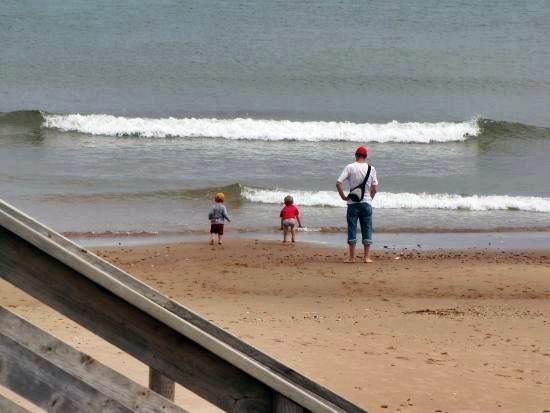
photo - mw
_______________________
To a Child dancing in the Wind
DANCE there upon the shore;
What need have you to care
For wind or water’s roar?
And tumble out your hair
That the salt drops have wet;
Being young you have not known
The fool’s triumph, nor yet
Love lost as soon as won,
Nor the best labourer dead
And all the sheaves to bind.
What need have you to dread
The monstrous crying of wind?
II
Has no one said those daring
Kind eyes should be more learn’d?
Or warned you how despairing
The moths are when they are burned,
I could have warned you, but you are young,
So we speak a different tongue.
O you will take whatever’s offered
And dream that all the world’s a friend,
Suffer as your mother suffered,
Be as broken in the end.
But I am old and you are young,
And I speak a barbarous tongue. William Butler Yeats
b. June 13, 1865
from Responsibilities and Other Poems, 1916
_______________________
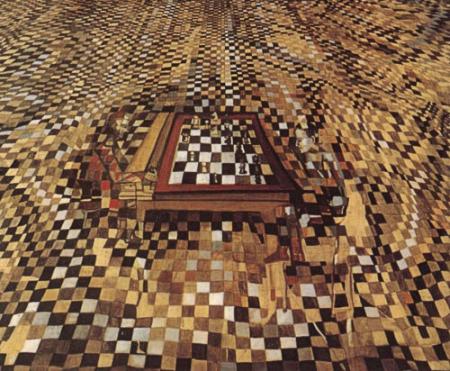
The chess game
1943
Maria Elena Vieira da Silva
b. June 13, 1908
_______________________
Three Poems
Olvido García Valdés
translated by Sophia Dahlin
Water is something of which I know nothing; thing I see and I watch and I hear and I touch and of which I know nothing. It appears in things I write; in some poems, there it is.
(....)
But in water there is light. With or without light, more lit or less, water is other. With its noise, at night, even in the city where at night it’s not absolutely night, water is other. “Strange to divide the earth into thought and water,” ruminated el fumigador de guardia.
From the factory of light, through the tunnel, come the dead. This is how the saint in the painting came, and his verdure, and I never knew I’d live alongside him. You don’t always see in the same way. Now I pay attention to the windowpanes, the nocturnal leftovers, and out in the street there are nubs of green ire, waiting.
...(more)
Topographies
Exchanges Literary Journal
Spring 2014
Poems by Olvido García Valdés
Translated from the Spanish by Catherine Hammond
Olvido García Valdés poems in Words without Borders _______________________
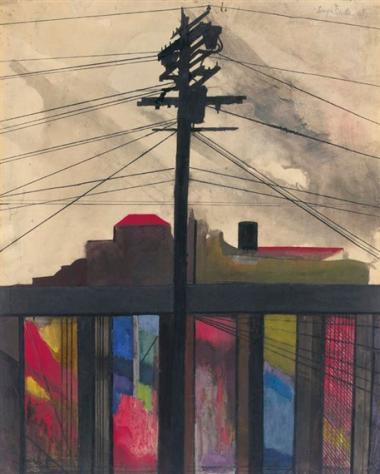
Telegraph Pole
Joseph Stella
_______________________
Rochelle Owens: Hermaphropoetics/Ice Water
from a work in progress
presented by Jerome Rothenberg
(....)
A master photographer
altering perception
a wall of brown dust
Six musicians chanting
drumming
squatting on their heels
Seven dancers
flexing
contracting hips
rump
thighs
sunlight/blackness
blinking in and out
Eight days of feasting
Signs and Wonders
the RUINSCAPE
disappearing
a strange rain
vertical/horizontal
blinking in and out
a glass of ice water sparkles
...(more)
Rochelle Owens Pages
Curated by Karl Young
Rochelle Owens atPennSound
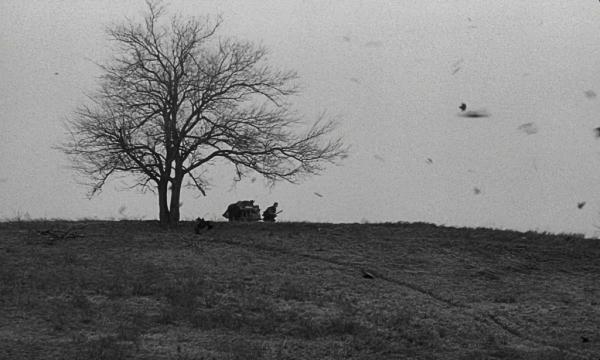
The Turin Horse
still
Béla Tarr
_______________________
What bird would light
in a moving tree
the tree I carry
for privacy?
Down in the grass
the question's inept;
sora's eyes . . .
stillness steps.
Lorine Niedecker
.....................................................
My other country (PoemTalk #77)
Lorine Niedecker, 'Foreclosure' and 'Wilderness'
jacket1 podcast
.....................................................
Foreclosure
Lorine Niedecker
Tell em to take my bare walls down
my cement abutments
their parties thereof
and clause of claws
Leave me the land
Scratch out: the land
May prose and property both die out
and leave me peace
Lorine Niedecker: selected poems
_______________________
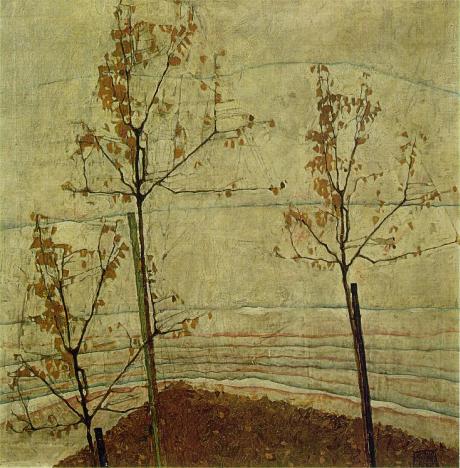
Egon Schiele
b. June 12, 1890
_______________________
The Last Days Of Mankind
Karl Kraus
Died: June 12, 1936
Translated by Michael Russell
full text
Avant-Garde in a Different Key: Karl Kraus’s The Last Days of Mankind
Marjorie Perloff
(....)
Discussions of the early twentieth-century avant-garde rarely refer to the writings of Kraus or Wittgenstein, of Joseph Roth and Elias Canetti, and, in the next generation, of Paul Celan or Ingeborg Bachmann. In part, this neglect has to do with the subordinate status of post-World War I Austria, whose literature has been treated, at least in the English-speaking world, as if it were merely part of the larger body of “German” writing. In this context, the emphasis on the Marxist literature of the Weimar Republic, from Bertolt Brecht to the great critical theorists Walter Benjamin and Theodor W. Adorno, has eclipsed its very different Austrian counterpart.
(....)
... suppose we go back to the original meaning of avant-garde. In its inception in the sixteenth century, the term referred to the front flank of the army, the forerunners, those ahead of their time whose work cannot yet be understood. In this sense, the Austrian modernists can now be seen to have produced a poetics of rupture perhaps as profound as that of their more formally radical counterparts in Italy, France, or Russia. Theirs was a world that Karl Kraus called the unimaginable—a world of a war whose purpose was never really defined and yet literally shattered their lives.
...(more)
.....................................................
It’s as if Kraus felt, sadly, that it would be delusional in the modern era to think it was possible to vault above the “noise,” as he called it, of daily events, yearn as he might. So instead he plunged into them, resentfully, furiously, but determined to yank out their false roots and expose what was missing or distorted. His aim was “to listen to the noises of the world as if they were the chords of eternity.” His anti-journalism had that positive thrust.
Rick Salutin
.....................................................
Karl Kraus, the Press, and War
Franz-Stefan Gady
(....)
... during the war, Kraus saw his principal literary and political task in unveiling the Masken des tragischen Karnevals (the masks of the tragic carnival) of war as he states in the introduction of the The Last Days of Mankind. Kraus attempted to unmask the manipulative doublethink nature of the liberal press that had unreflectively embraced jingoism and military romanticism -- despite its proclaimed humanistic and liberal values -- and which he considered more dangerous in swaying public opinion towards war because of the media's alleged use of verhuellte Worte (veiled words). In comparison, Kraus viewed overtly right or leftwing radical publications, those that plainly stated their true agenda, as less malignant.
(....)
Despite Kraus's personal shortcomings, The Last Days of Mankind is a prescient play in the sense that Kraus foresaw the dangers of ideologically driven language and the destructive power of a hijacked media abetted by mass hysteria and societal warmongering.
Kraus can be compared with George Orwell, whose influential essay "Politics and the English Language" displays a similar outrage in attacking the misuse and decay of language during war. Orwell's dictum on political rhetoric could have appeared verbatim in a pre-war issue of Die Fackel, "Political Language -- and with variations this is true of all political parties, from Conservatives to Anarchists -- is designed to make lies sound truthful and murder respectable, and to give an appearance of solidity to pure wind."
Kraus's perplexing aphorisms and linguistic legerdemain and Orwell's sparse prose are two sides of the same argument against political euphemism employed to dehumanize and enslave a population for the sake of a 'higher good' or grosse Zeit (extraordinary times). As the more than eight-hundred-page play illustrates, Karl Kraus possessed a rare faculty to dissect complex political and social phenomena with surgical precision and to expose the Masken (masks) of propaganda despite a fatal European euphoria for war. Kraus was passionately resigned, in Swift's words, "to vex rogues, though it will not amend them."
...(more)
.....................................................
Torch Song
Marjorie Perloff
(....)
Given the uncanny relevance of Kraus’s political writings—and all his writings whatever their genre, are essentially political—to our contemporary culture, it is high time for a Kraus revival, or at least arrival, in Anglo-America. The British historian Edward Timms’s monumental biography should do much to pave the way. His is a richly documented account of Kraus’s brilliant and merciless exposure of political spin and moral hypocrisy in the early twentieth century; it provides, moreover, extraordinarily detailed information about the cultural and political life of modern Vienna and its interlocking professional and social circles. Indeed, the detail can be irritating: Timms seems to share Kraus’s own passion for putting it all in.
...(more)
_______________________
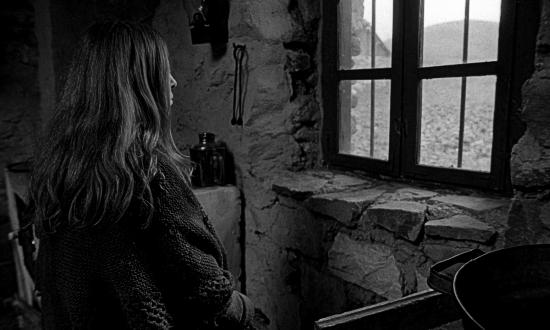
The Turin Horse
_______________________
béla tarr’s turin horse
Richard Marshall
3:am
(....)
Some catastrophes are unknown. Some are unknowable.
Knowledge of catastrophe is limited by our imagination which is not limitless. For Nietzsche we think only in the form of language and are trapped by prejudices inherited from this to believe that distinctions of subject/predicate, cause/effect, noun/verb and so on are ontologically grounded, that they are in some tight isomorphic relationship with reality. Not only do these prejudices isolate us from knowing the world, we are isolated from ourselves too. The practices and conventions that give us practical guidance to make sense of our own linguistic meaning, sans Wittgenstein’s over-optimistic assumption that such meanings must be shared, all those personal idiolects, adjusted vocabularies and syntax that detach us from any default convention in order to respond to local circumstance leave us with fragile, lonely and private worlds.
Tarr’s film dwells for as long as it can with two characters whose isolation is stripped down to an abject extreme. The regularities of their trapped behaviours – feeding the horse, being dressed and dressing, eating squalid potatoes, drawing water from the well, these are repetitive sequences of primitive solutions to the universal problem of how to coordinate and communicate beliefs and actions. And the catastrophe that unfolds, the storm blowing like the ash of a burning universe, is a dark matter that dissolves each grim uniformity, every regularity, and in so doing wrecks any scantily dressed default understanding of reality, self and communication. Tarr portrays this as an event that occurs across an extreme boundary. It is a catastrophe that remains beyond them. It dissolves the world into pitch.
History goes on only to the limit of our comprehension because it is about us. A history that wasn’t our history would be incomprehensible. The world that isn’t our world too. Physics is included in this, for physics is guided by the overweening belief in truth as its ultimate value. And all values come from us. If not, where else? This philosophical position is historicist, archeological, anthropological and genealogical. It is the soul of Nietzsche’s nihilism. Husserl similarly was a nihilist when he declares geometry a human device linked to our practical needs and activities. So too was Marx a nihilist when he said that to understand science we had to understand its social genesis. Nihilism isn’t a belief but is rather the default process of modernity.
...(more)
_______________________
The Thinking Image:
Fred Kelemen (Tarr’s cinematographer) on Béla Tarr and The Turin Horse
_______________________
An Interview With Bela Tarr: Why He Says 'The Turin Horse' Is His Final Film
Eric Kohn
... I'm not a real filmmaker. I've always been in it for the people and just wanted to say something about their lives. During these 34 years of filmmaking, I've said everything I want to say. I can repeat it, I can do a hundred things, but I really don't want to bore you. I really don't want to copy my films. That's all.
(....)
At the beginning of my career, I had a lot of social anger. I just wanted to tell you how fucked up the society is. This was the beginning. Afterwards, I began to understand that the problems were not only social; they are deeper. I thought they were only ontological. It's so, so complicated, and when I understood more and more, when I went closer to the people… afterward, I could understand that the problems were not only ontological. They were cosmic. The whole fucked up world is over. That's what I had to understand, and that's why the style has moved. Once I went down, I kept going down. The style became more and more downward, by the end, becoming more simple, very pure. That's what was interesting for me, to discover something step by step.
(....)
I don't care about stories. I never did. Every story is the same. We have no new stories. We're just repeating the same ones. I really don't think, when you do a movie that you have to think about the story. The film isn't the story. It's mostly picture, sound, a lot of emotions. The stories are just covering something. With "Damnation," for example, if you're a Hollywood studio professional, you could tell this story in 20 minutes. It's simple. Why did I take so long? Because I didn't want to show you the story. I wanted to show this man's life.
...(more)
_______________________
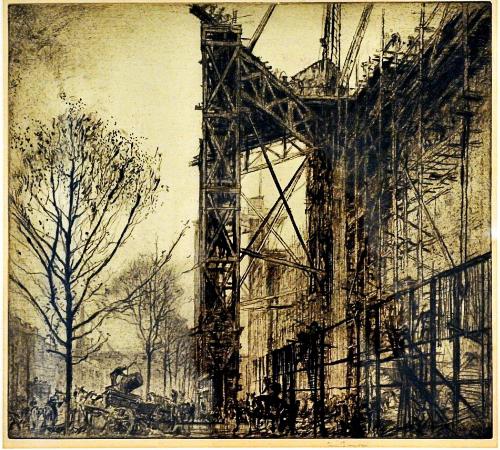
Scaffolding
Frank Brangwyn
d. June 11, 1956
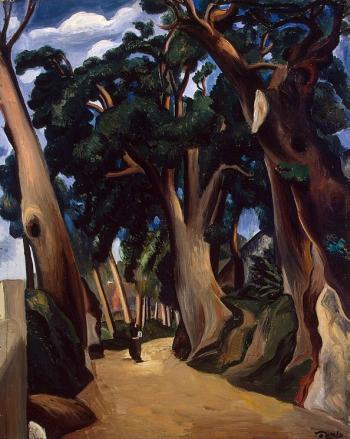
Road to Castel Gandolfo
1921
André Derain
b. June 10, 1880
_______________________
I don’t ‘define myself’ as any sort of writer. But I do feel an affinity with writers, such as Kafka and Bernhard who recognise the human need to tell stories but doubt whether they can do it or even if it can or should be the aim of the writer who wishes to be truthful to do so. I am as little interested in writers like Ricardou in France or Barth in America, who are quite cynical about story-telling, and writers like Roth or Ishiguro, who go on doing so, even while seeming vaguely to feel that they are doing so in bad faith. I love Tristram Shandy, which is about someone desperately trying to get the story of his life written and constantly failing. Very funny and very profound.
Interview with Gabriel Josipovici
Critical Perspectives on Gabriel JosipoviciRevue LISA
vol. XII - 2
via Stephen Mitchelmore
“Revealing what cannot be spoken” – Gabriel Josipovici’s Short Stories as Illustrations of Transcendental Negativity
Werner Wolf
Josipovici once said in an interview: “I love the form of the short story”. (Signorelli online)
This love is demonstrated by the fact that so far he has published no fewer than five short story collections. The most recent one is Heart’s Wings and Other Stories (2010), which was preceded by Mobius the Stripper: Stories and Short Plays (1974), Four Stories (1977), In the Fertile Land (1987) and Steps: Selected Fiction and Drama (1990). This predilection for the short story form is particularly understandable in the case of Josipovici, since it reflects one of his principal aesthetic tendencies: a reductionism which in many cases may even be called minimalism and which often produces gaps of meaning or Leerstellen sensu Iser (1970/1975) and an effect of fragmentation.
This reductionism, which to a certain extent accounts for Josipovici’s eccentric position as a non-mainstream writer, is most conspicuous on the content or story level of his fiction. As in texts by Samuel Beckett, with whom his fiction shares quite a number of features, his settings tend to be almost bare rooms with windows framing lonely, often anonymous figures gazing out. Frequently, these figures are authors or artists – bespeaking a conspicuous metareferential5 tendency to which we will return later. The action of Josipovici’s stories is also characteristically reductionist as far as events are concerned. His plots tend to lack teleological closure (a narrative ending being one of the most powerful means of creating and arresting meaning) and often appear to be aimless, repetitive and static rather than dynamic unfoldings of happenings and events. In many cases the action is reduced to monologues and dialogues – and thus to linguistic action. All of this is already enough to frustrate conventional reader expectations.
Such expectations are further frustrated by the fact that these building blocks of Josipovici’s story-worlds, in addition to being minimalist, are often unreliable and turn out to be curiously instable or even contradictory. This refers to spatial relationships as well as to the linearity of time, the identity or at least clear identifiability of characters and, as a particularly characteristic feature of these story-worlds, also to the distinction between dreams or thoughts and waking life, between fiction and reality, distinctions which often become blurred, in particular by means of metalepses.
...(more)
_______________________
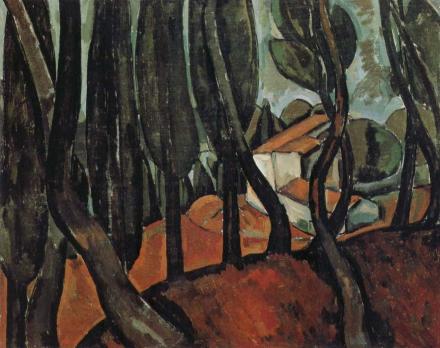
Forest at Martigues
André Derain
c1908-9
_______________________
An Attempt to Reach Beirut by Sea
Sargon Boulus
Translated from the Arabic by Suneela Mubayi
One distant evening
while I smuggle a fountain through the wreckage
or bribe a night with a mediocre poem
You bleed
in the cold trenches of the ceasefire
from your thousand battlefronts
I wanted to lay out a path with a carpet of my breaths
to where you still stand
Your barricade a dove’s skeleton
Your face a wounded paradise
I wanted to burn a little between your hands
No place dreams of my arrival
and Life
My frightened fugitive:
When it opens its eyes
every moment gets ready to be born
in its cradle floating between my bones
I wake upon foreign seas
and my life braces itself against me
(....)
In the crevices of the Mediterranean and the Aegean
the wind
- a blind widow
looks for no one
Yet sometimes its hands glide/scrape over
- like sandpaper over a heart’s entrances
where red salt gathers, where it pauses
In that moment, Dawn, masked, traverses the bridges
As while I tell Life: draw near!
I vow not to harm you, draw near!
Beirut ascends every night
like a lost scream
from the murdered man’s fixed gaze
Or travels surreptitiously like poverty’s candle
between the ladders resting on the walls of my breast
And while I say:
Do not do a single thing in my absence
I implore you, Life, and in one fell swoop make me see
your stomach perforated by the snipers of the abyss
At night
Beirut tells the Night”
You must go to the heart’s edge
There, I will be your words
You must lick this cold bone
so that its nakedness may illuminate your Night
...(more)
Summer Reading: New Arab Poetry Translations Online
_______________________
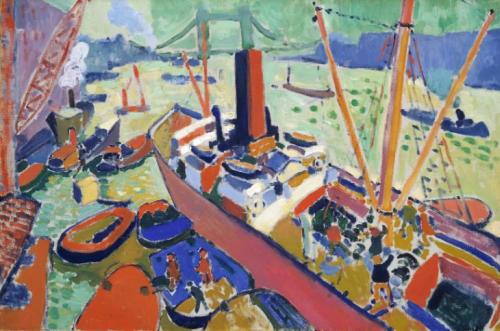
The Pool of London
André Derain
1906
_______________________
Drop Anchor: The Return of the Desktop Computer
Navneet Alang
hazlitt
(....)
It isn’t that technological changes result in one mode of thinking completely subsuming another. Instead, our relationship to reality is expanded and complicated by the ways in which technology re-renders ideas we once thought we understood. A document can be a thing that is never finished, or it can be bound in a book and retain a degree of fixity. What we are now confronted with is not the upending of one system and the installation of a new regime, but the difficulty of grappling with both at once: the cloud and the file folder, the iPod and the streaming service, the desktop computer and the tablet with nothing on it but a connection to the web.
Often, this back and forth can get caught up in the cycle of fashion: that the return to vinyl records could be as much affectation as it is affection. Maybe, though, it’s a kind of mental anchor—a way of rooting oneself against the feeling that everything is becoming immaterial, even when it is not.
...(more)
_______________________
#YesAllWomen Changes the Story of the Isla Vista Massacre
Rebecca Solnit
(....)
In a fascinating op-ed piece last year, T.M. Luhrmann noted that when schizophrenics hear voices in India, they're more likely to be told to clean the house, while Americans are more likely to be told to become violent. Culture matters. Or as my friend, the criminal-defense investigator who knows insanity and violence intimately, put it, "When one begins to lose touch with reality, the ill brain latches obsessively and delusionally onto whatever it's immersed in—the surrounding culture's illness."
(....)
Language is power. When you turn "torture" into "enhanced interrogation," or murdered children into "collateral damage," you break the power of language to convey meaning, to make us see, feel and care. But it works both ways. You can use the power of words to bury meaning or to excavate it. If you lack words for a phenomenon, an emotion, a situation, you can't talk about it, which means that you can't come together to address it, let alone change it. Vernacular phrases—Catch-22, monkeywrenching, cyberbullying, the 99 percent and the 1 percent—have helped us to describe but also to reshape our world. This may be particularly true of feminism, a movement focused on giving voice to the voiceless and power to the powerless.
(....)
... Domestic violence, mansplaining, rape culture and sexual entitlement are among the linguistic tools that redefine the world many women encounter daily and open the way to begin to change it.
The nineteenth-century geologist and survey director Clarence King and twentieth-century biologists have used the term "punctuated equilibrium" to describe a pattern of change that involves slow, quiet periods of relative stasis interrupted by turbulent intervals. The history of feminism is one of punctuated equilibriums in which our conversations about the nature of the world we live in, under the pressure of unexpected events, suddenly lurch forward. It's then that we change the story.
I think we are in such a crisis of opportunity now, as not one miserable, murderous young man but the whole construct in which we live is brought into question. On that Friday in Isla Vista, our equilibrium was disrupted, and like an earthquake releasing tension between tectonic plates, the realms of gender shifted a little. They shifted not because of the massacre, but because millions came together in a vast conversational network to share experiences, revisit meanings and definitions, and arrive at new understandings. At the memorials across California, people held up candles; in this conversation people held up ideas, words and stories that also shone in the darkness. Maybe this change will grow, will last, will matter and will be a lasting memorial to the victims.
Six years ago, when I sat down and wrote the essay "Men Explain Things to Me," here's what surprised me: though I began with a ridiculous example of being patronized by a man, I ended with rapes and murders. We tend to treat violence and the abuse of power as though they fit into airtight categories: harassment, intimidation, threat, battery, rape, murder. But I realize now that what I was saying is: it's a slippery slope. That's why we need to address that slope, rather than compartmentalizing the varieties of misogyny and dealing with each separately. Doing so has meant fragmenting the picture, seeing the parts, not the whole.
...(more)
_______________________

Window on the Park
André Derain
1912
_______________________
Rainbow Shatterings: What Ever Happened to Modernism?
Gabriel Josipovici
by Stephen Mitchelmore
(....)
For Josipovici, Modernism reanimates the doubts and confusions about the authority of art that have been with us since the Enlightenment; doubts and confusion that he shows are present as dynamic forces in the great, paradigmatic works of Western literature and essential to the reasons why they became great. For cultural gatekeepers, accommodating doubt and confusion rather than quelling their disruptive presence is anachronistic, the stuff of romantic legend or, worse, against the spirited positivity of modern culture. Peter Aspden says Modernism has “found its dancing shoes and lightened up”. Surely literature is here to bring clarity and sense, to reveal the world in all its variety, intensity and, above all, reality?
Perhaps. But this is an understanding from a watchtower, from outside of writing. When a novel, good or bad, is complete, it creates and embodies unity – even if it relies for this impression on stories of the ultimate rupture of terror, violence and death – and gratitude is expressed by the reader. Then we are bound to be irritated by someone coming along to point out that it is an artificial and constructed unity; yes, we know it is only a novel. Except, however commonsensical this statement may be, it has always to elide the uncanny experience of reading; the sense that it is only within the ideal space of the greatest novels that we feel most engaged with the world, where the doubts and confusions of our lives abate and we become able, for the time of reading at least, to maintain understanding and equilibrium. This is our gratitude but also our guilty secret. We know it is only a novel and the world has thereby been distorted and we need more art to maintain the illusion. Bad faith kindles doublethink.
...(more)
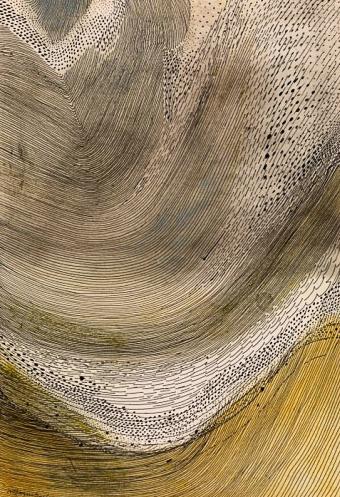
Sea Sound No. 9
1980
A Discipline of the Mind
The Drawings of Wilhelmina Barns-Graham
_______________________
Strange galvanics (PoemTalk #75)
Will Alexander, 'Compound Hibernation'
Compound Hibernation
Will Alexander
Those who glance about me
Who cease to see inside the sun
Who cease to imagine its destabilized pre-quanta
Cannot know me
Cannot know my ethos as pumice
As mingled apparition or flare
My perception through the prior sun that I ingest like a blackened pre-
existence
Or collected hawks
through assignation
The sun with its dualisms
with its dualisms
With its prebiotic photons which waver
Perhaps
9 suns before the sun existed
Before the oceans seemed formed
there were molecular drafts
Akashic precursors
floating proto-ammonia
I think of carbon
& whisps
& floodings
Of feral combat shelter
where blank geometry accrues
...(more)
_______________________
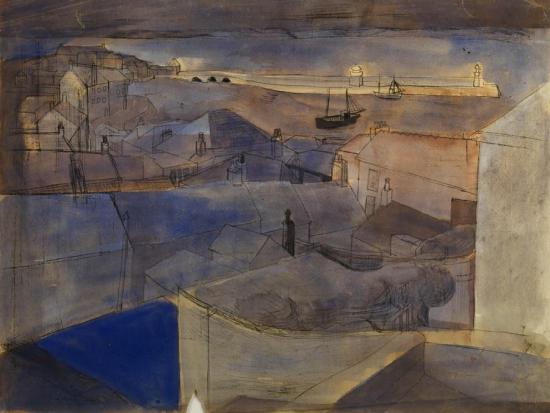
St Ives
Wilhelmina Barns-Graham
1947
_______________________
The Psychotropic Squalls
Will Alexander
To peer into the obverse
into smoking cane field erratums
as if haunted with the steamy colitis of whirling iridium
cancellations
as in the saliva of newts
one sees the intestinal raging of deltas
of blackened sea giraffes osmotically split into simultaneous alums
above a judgemental sea glistening with Richters
like a weakened neutron egg
its fissioning petrol mirages like spirals of irregular hunting geese
flying through flames of ulcerated smoke & gargantua
hissing a blank imperial greenness
rising above dense jetties of cobras
the shocking demise of the sea
...(more)
Will Alexander at the Poetry Foundation and PennSound
_______________________
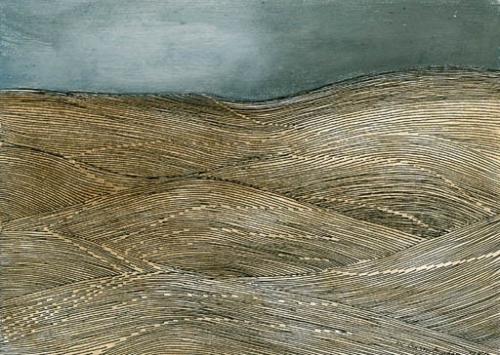
farm track
Wilhelmina Barns-Graham
1980
_______________________
“My Interior Vita”
Will Alexander
with a note in celebration
[From the forthcoming Compression & Purity, poems (City Lights Spotlight No. 5)]
presented by Jerome Rothenberg
I was born under Leo, under its signpost of heat, and what has evolved from such colouration is a verbal momentum always magnetized to the uranic. A verbal rhythm prone to the upper hamlets of starlight, my predilection being instinctively honed to the fluidic motion of the sidereal. This is not to say that the protean aspects of earth cease to amaze me, or cease to enthrall me with its natural magic. The winds, the bays, the deserts, ceaseless in my mind like a teeming field of Flamingo flowers, or a sun-charged clepsydra. Yet above all, the earth being for me the specificity of Africa, as revealed by Diop, and Jackson, and Van Sertima, and its electrical scent in the writings of Damas.
Because of this purview I have never been drawn to provincial description, or to the quiescent chemistry of a condensed domestic horizon. I’ve always been prone to exploring the larger scope of predominant mental criteria as exhibited by the influential civilizations over the span of time which we name as history. ...(more)
_______________________
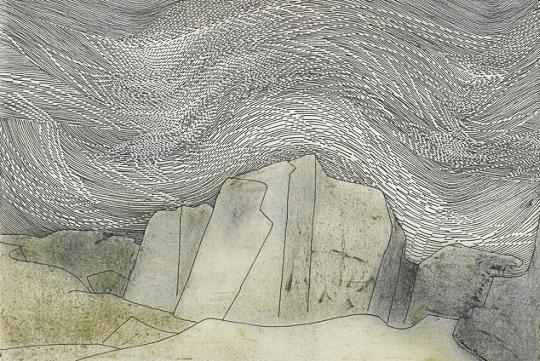
Porthmeor
Wilhelmina Barns-Graham
Born: June 8, 1912
_______________________
The Search for Heinrich Schlögel – A Novel Sent in Fragments
Martha Baillie
lemon hound
Bitten by doubt, I pick at my prose. I stop writing. Though the novel is nearly done, a crucial element is missing. To prevent myself from destroying the manuscript, why not turn it into something other? Could it “coexist” in a second form?
In the novel the year is 1974 and a teenaged German, named Heinrich, longs to escape the claustrophobia of his hops-growing hometown of Tettnang. In 1980 he will arrive in Canada. It is still the era of letters and postcards. From Pangnirtung, on Baffin Island, he’ll hike alone up the Weasel River to the Turner glacier and back. This should take him two weeks. But for reasons unknown to him, he’ll be yanked from the 20th century and deposited in the 21st. When he returns to Pangnirtung, thirty years will have vanished though he is no older. A computer-nimble, Inuit teenager will befriend him, while he struggles with his predicament.
I experience a sudden hunger to send Heinrich Schlögel travelling in fragments, away from me, through “real” time. What if I were to copy the novel onto the back of postcards and drop it, bit by bit, into to the machinery of Canada Post? I gather postcards into a small mound.
From the AGO I buy crisp new postcards, and in a used bookstore where the vintage postcards, arranged by theme, fill several shoeboxes on a shelf, I spend more money than I’d intended. I put out a call for donations and soon am inundated: souvenir images from the Freud Museum in London, Star Trek, Ikea, Disney Land, A New Brunswick amateur taxidermist who stuffs squirrels and dresses them in costumes. The possibilities multiply. Can such random cards successfully illuminate my novel?
...(more)
_______________________
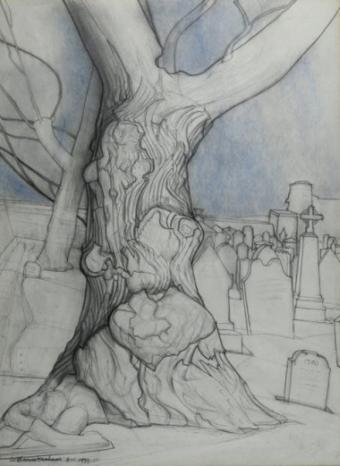
Old Oak Tree
Wilhelmina Barns-Graham
_______________________
Parrhësia
Today: Drone Strikes, Fearless Speech and theContentious Politics of Security
William Walters
abstract
Foucault is more often used to theorise political logics of securitisation than to
understand the contestation of security policies. Yet Foucault’s work offers a wealth of
conceptual tools and ideas pertinent to the study of the contentious politics of security.
In his lectures on parrhësia in Ancient Greece, Foucault explored the practice whereby
individuals choose at great risk to confront rulers or publics with uncomfortable truths.
This article argues that a refashioned concept of parrhësia can illuminate certain
elements of the contentious politics of security today. The article develops this claim
through an examination of the photojournalism of Noor Behram, a man who has
spent four years photographing and exposing US drone strikes in the region of
Waziristan in Pakistan. The article analyses Behram’s activity in terms of parrhesiastic
exposure, a concept that is intended to capture aspects of the changed circumstances
under which fearless speech can be exercised in mass-mediated, globalised societies.
The article concludes by observing how further engagement with parrhësia might
contribute to our understanding of political action, the relationship between emotions
and political struggle, and the politics of secrecy.
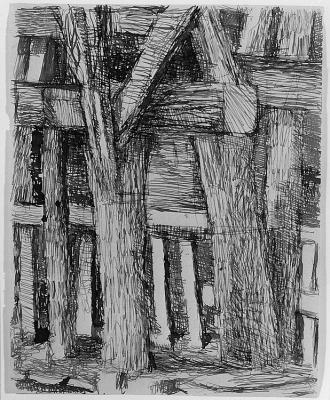
Louis Soutter
b. June 4, 1871
_______________________
My Bones
Marie-Claire Bancquart
Translated from French by Christina Cook
My bones have beautiful remains
already cut, it’s true
already
mended together
as they bravely remain.
They hold
my flesh and skin on.
I bring their troop along
and bring myself along with it
(old impression: being only partly part of it)
to museums, before the glass of prehistoric displays
where, among the supposedly sharpened stones, arrowheads,
are femurs, visibly broken
but pieced back together.
Which just goes to show, in ten thousand and some-odd years,
my dear bones now on the asphalt, you can appear
in exhibitions mounted after a loco labor
near beer bottles and submachine guns,
this old rack
in my life
that has wracked me.
Four PoemsMarie-Claire Bancquart Translated from French by Christina Cook
Writing the Rack That Wracks Us: On Translating the Poetry of Marie-Claire Bancquart
Christina Cook
One of the many things I have Marie-Claire Bancquart to thank for is introducing me to the world of things. I don’t mean an initiation into the pleasures of 24/7 QVC or a penchant for crying into piles of pricey men’s shirts à la Daisy Buchanan. Rather, she helped me see myself as one thing among many which exist in concert with one another—and it is an illuminating, humbling vision.
(....)
When I sat with Marie-Claire Bancquart in her study in 2005, she told me: “I think earthly things are destined to die like the earth itself. And this common death brings us much closer to the animals, plants, and all things on the earth. I don’t think there’s any fundamental difference between us and these other things, for example, between my cat and myself.” (full interview in Cerise Press, Summer 2010)
The comfort she finds in this worldview is functionally no different than the comfort a Christian finds in the promise of Heaven, or the assurance a Hindu finds in reincarnation—except one could say hers requires a little more, well, bravery. This bravery plays out in her poetry through unapologetically no-frills language and powerful concrete imagery, much of which is set in Paris, encompassing everything from bugs on the undersides of old bridges to the glittering Eiffel Tower. Her poem, “Millennia,” for example, distills mankind’s physical connection to the world into an image of a Parisian street market: “Mankind, this late in coming, rewinds a thread of the world/along the stalls of early produce/crates, market palettes/smell, wet, like their tree of origin.”
These deceptively simple lines open up a sweeping vision of mankind’s umbilical connection to its pre-existence on earth. Where this poem offers a large-scale panorama, her poem “My Bones” gives an intimate close-up of the speaker imagining what her own bones’ existence will be like after she—in whom they presently cohere—expires:
...(more)
Writing About the Concrete: Marie-Claire Bancquartinterview with Christina Cook
View with Pagination
Five Poems
Marie-Claire Bancquart
translated from the French by Wendeline Hardenberg
TWO LINES Online January 2012
Center for the Art of Translation
_______________________
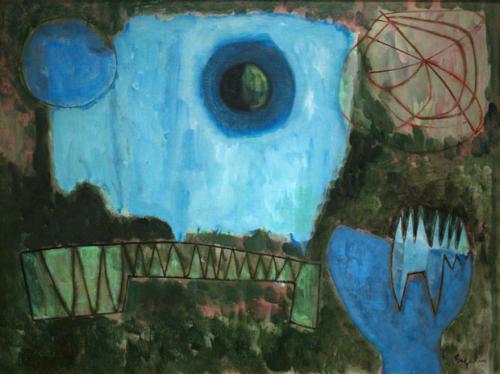 Moon Forms
William Baziotes
d. June 6, 1963
_______________________
Noë and Uexküll: Ecology, Style, and Meaning
Adam Robbert
I have been exploring Alva Noë’s actionist account of perception and cognition in terms of an ecological account of the subject-concept relation. In my previous posts (here and here), I have emphasized a level of conceptual understanding that presupposes both language and the capacity to learn new concepts, or, more interestingly, I have described the way in which a subject can never really learn anything new but rather can only become someone with a new set of conceptual capacities through learning and practice. In this view, the subject-concept relation is ecological insofar as the concept has a symbiotic relation to the subject that both displaces and creates new conceptual capacities. To be more specific, and to repeat my phrasing from the earlier posts, learning initiates a symbiosis between subject and concept that ends in the merging of the concept with the subject and of the transformation of the subject through its understanding of the concept.
In this post I expand the discussion in two ways. First, I look at how Noë’s approach to conceptual understanding is not limited to nor dependent upon linguistic ability. Instead Noë chooses a broadly Kantian approach that also instantiates conceptual understanding at the level of bodily experience. Second, I link Noë’s account of understanding and perception to Jacob von Uexküll’s approach to multispecies ethology, which also takes an expanded Kantian form. ...(more)
Knowledge EcologyThe world is already stranger than it is
via —synthetic_zero
_______________________
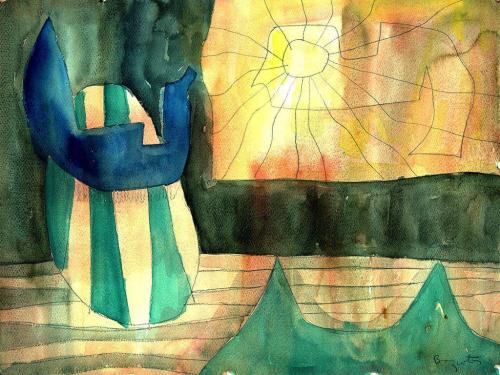
William Baziotes
_______________________
Savage capitalism is back – and it will not tame itself
Capitalists spread prosperity only when threatened by global rivalry, radical movements and the risk of uprisings at home
David Graeber
(....)
Capitalism does not contain an inherent tendency to civilise itself. Left to its own devices, it can be expected to create rates of return on investment so much higher than overall rates of economic growth that the only possible result will be to transfer more and more wealth into the hands of a hereditary elite of investors, to the comparative impoverishment of everybody else.
In other words, what happened in western Europe and North America between roughly 1917 and 1975 – when capitalism did indeed create high growth and lower inequality – was something of a historical anomaly. There is a growing realisation among economic historians that this was indeed the case. There are many theories as to why....(more)
_______________________
On the Upcoming Provincial Electoral Circus
Joshua Moufawad-Paul
M-L-M Mayhem!
The Ontario elections are upon us again and the electoral circus has reached the point of self-satire. Now the New Democratic Party [NDP] has stopped pretending that it represents even the most privileged sector of the working-class and has instead adopted a right populism in a jaded attempt to steal votes from the conservatives. The logic of the economic crisis, that has succeeded in pushing all parties further to the right, has permitted the party that once pretended to represent the working-classes to outpace the Liberals in this rightward drift. Hell, the NDP representative just one riding over from mine is an unabashed zionist who is proud of her service to right-wing Ukrainians in getting the "Holodomor" recognized as a genocide––a very timely candidate, to be sure, since the fascists now in power in Ukraine are the ones most responsible for pushing this ideology.
...(more)
_______________________
Frédéric Gros
interviewed by Michael Schapira
full stop
(....)
I am a walker and I am also a philosopher, so I wanted to write a book (A Philosophy of Walking) that considered both parts of myself equally. This relationship between philosophy and walking may seem surprising at first, not least because, when we think of a philosopher, we typically imagine him stooped over his desk, surrounded by books rather than wandering around outside. But there have certainly been many philosophers who were also excellent walkers, and who insisted that their long walks were essential to the development of their thought. If you take certain famous examples like Rousseau or Thoreau, they all say that they would not have had their greatest ideas, they would not have opened new perspectives, they would not have found new concepts and conceptions, without this regular, solitary exercise.
(....)
... it was Nietzsche who was the most important philosopher for me. Walking is really a central element of his œuvre, his philosophy. He didn’t walk because he wanted to rest, because he wanted to recover from the fatigue of writing. The only way for him to feel good was to go walking, so he set out into the mountains with notebooks. He walked the whole day long, six or seven hours per day, stopping only to jot down notes, which he then expanded in the evenings.
...(more)
_______________________
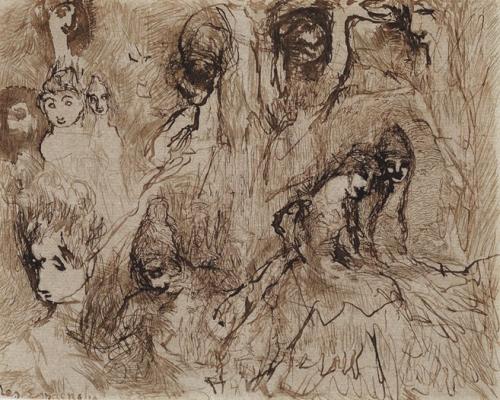
Louis Soutter
_______________________
Millennia
Marie-Claire Bancquart
Translated from French by Christina Cook
Mankind, this late in coming, rewinds a thread of the world
along the stalls of early produce
crates, market palettes
smell, wet, like their tree of origin.
Nearing the very depths of us
transfusion
of the millennial mildew
trunks, grasses
beneath the rising of the waters.
The silken flesh, the acrid peat merge
on this urban curbside
splattered by cars.
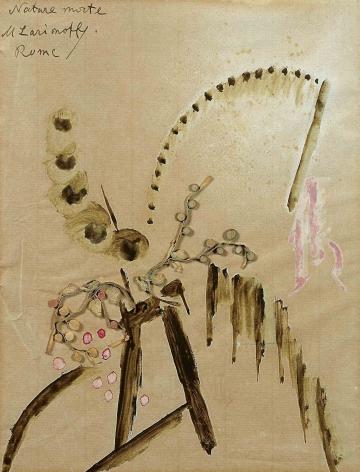
nature morte
1916
Mikhail Larionov
b. June 3, 1881
_______________________
Nietzsche and the Burbs
Lars Iyer
Bright colours. A spongy sofa. The counsellor, practically knee to knee with you. The counsellor, giving you a chance to speak, to have your say. The counsellor, taking you seriously. And what are you going to say? What will you tell her?
I am dead, tell her that. I’ve never been born, say that. Something in me is not alive, say that. Death has opened its eyes in mine, say that.
My limbs feel heavy. My head feels heavy, say that. I can barely lift my arms. I can barely lift my eyelids, say that. I want to sleep all the time. I want to lie down, say that.
I don’t feel real. I don’t think anything is real, say that. I feel numbed. Stunned, say that. I am a puppet. Someone else is controlling me. Something else. Say that.
I am made of glass, say that. I have no insides, say that. My voice is not mine, say that. My heart is not mine. My hands are not mine. My brain is not mine. Say those things, blank-voiced, desolate.
And then, looking up, bright-eyed, wild-eyed, tell her of your joy – your wild, impersonal joy. Tell her of time torn open. Torn apart. Tell her of demented time. Tell her that you’ve been outside. Tell her you’ve heard non-human laughter.
...(more)
_______________________
from Toot Sweet
Daniel Owen
spigot a form to water
oceans of grief
ill consumed in time to dance
on faces in rooms in the quiet
before speech or non-speech
we’ve all been
there before what else
what little else in the space
between light and touch
over the mountains a tourist
bears a sack of rests
...(more)
The Recluse
The online journal from The Poetry Project Issue 10 _______________________
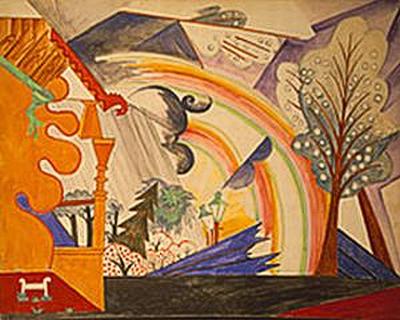
set design
Prokofiev's "The Buffoon"
(1921)
Mikhail larionov
_______________________
Subjective Cameras Locked-In and Out-of-Body
Christian Quendler
Abstract
In this essay, I examine conceptual metaphors of the camera eye as figurations of the cinematic
dispositif that reflect on sensory and symbolic aspects of cinema. Since camera-eye metaphors often
hypothesize between medial, formal and experiential dimensions of film, they are particularly
insightful for studying embodied conceptualizations of cinema. Drawing on insights from
phenomenology and cognitive semiotics, I will investigate how filmic camera-eye metaphors blend
sensory knowing with conceptual knowledge structures. My case studies are two recent
explorations of camera-eye vision that offer a self-reflexive commentary on the history of cinema:
Julian Schnabel’s Le Scaphandre et le papillon (The Diving Bell and the Butterfly, 2007) and
Gaspar Noé’s Enter the Void (2009). Both films celebrate the deep-seated metaphorical base of
cinema as a form of vicarious experience and its constructive power to create alternative and
abstract models of reality. The Diving Bell and the Butterfly presents the experience of locked-in
syndrome through a pastiche of historical film styles. Enter the Void renders the psychedelic state of
the protagonist’s near death experience through a series of camera loops that draw on new imaging
technologies. I will discuss these films as critical responses to traditional notions of filmic
storytelling that extend the narrative scope by including sub-personal dimensions of experience.
Metaphor, Bodily Meaning, and CinemaImage and Narrative Vol 15, No 1 (2014)
_______________________
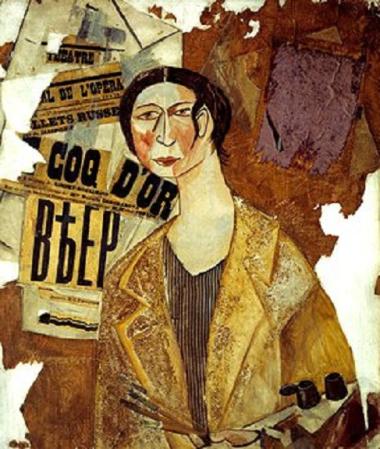
Portrait of Natalia Goncharova
Mikhail Larionov
_______________________
from Ghost of Intention
Judah Rubin
The Recluse
I am the stone that kills me
–Kamau Braithwaite
Say there is money but it rusted
–Lorine Niedecker
II.
Susan Howe says
it is from
enclosure that American history
emerges — then, too
from silence of the border
itself — mutation of the land and
scars upon
it. The bondsman — helial
within the
seismic mediate — the dark
shivered to know the text as hanging
matter, loose and between
the effluorescent missive
The captivity narrative
extends in heresy to
our present
the unfolding of
a deferrent chimera.
...(more)
_______________________

La Pluie
Mikhail Larionov
1904-1905
_______________________
If being a writer is like being a swimmer, and life is like the ocean through which you swim, then Knausgaard's book starts out being about the waves but ends up being about the stroke.
What Is The Struggle In “my Struggle”?Joshua Rothman
(....)
Writers have portrayed consciousness in all sorts of ways: as what William James called “an alternation of flights and perchings” (“Mrs. Dalloway”), as a river-like flow, carrying thoughts and perceptions in its current (“Ulysses”), as the creation of an unseen, inner artwork (“In Search of Lost Time”). Knausgaard has found his own way of understanding it: as a struggle. It’s the struggling that gives life its texture—constant, absorbing, and unending, the same whether you’re nine, nineteen, or thirty-nine. Like many struggles, this one is simultaneously tormenting and rewarding, heroic and pathetic, dynamic and static, purposeful and a waste of time. The main thing is that you can’t stop struggling. You’re a creature of struggle. You desperately want to win each battle but you never want the war to end.
...(more)
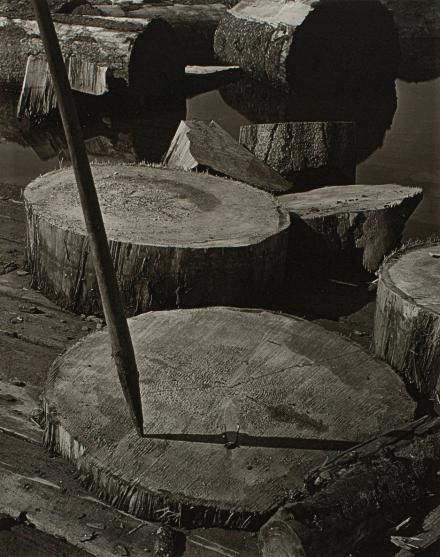
lily pads and pike
1939
Minor White’s Manifestations
new yorker
_______________________
Nature’s Agents: Chreods, Code, Plato, and Plants
Lisa Swanstrom
electronic book review
“The men of old, unlike in their simplicity to young philosophy, deemed that if they heard the truth even from “oak or rock,” it was enough for them.” —Plato
“The leap from living animals to humans that speak is as large if not larger than that from the lifeless stone to the living being.” —Martin Heidegger
“Today was a sunny day and I was able to sunbathe a lot… I had quite a bit of fun today.” —Midori-san, the Blogging Plant
(....)
Bracketing temporarily the thorny, stubbornly human associations we have with terms like “agency,” “emotion,” and “mind,” I want to argue in this essay that entities such as Midori-san perform what I am calling the aesthetic strategy of correspondence. Put simply, correspondence occurs when artists pair digital technology with objects, entities, and features of the natural world, in order to allow them the ability to communicate in human terms, a process that occurs through the translation of raw data into readable signs. The consequence of this strategy is that avenues of natural agency and aesthetic agency, terms that are related but signify different modes of experience, broaden substantially.
Such works mark a fascinating evolution in the history of environmental aesthetics, one that has the potential to intervene positively in the way we conceive of and relate to natural spaces. I begin with Midori-san, the blogging plant, to provide an overt example of this type of action in work, and although I will refer to “her” throughout this section, in the following pages I turn to two other projects in greater detail, both of which translate the voice of the natural world into human terms in perhaps more subtle ways. The first is a living art installation by Doug Easterly and Matt Kenyon, Spore 1.1., which uses rubber tree plants to “speak” about problematic cycles of consumption and unsustainable growth. The second is slippingglimpse, a piece of electronic literature by Stephanie Strickland, Cynthia Rowland, and Paul Ryan, which reveals the patterns of ocean waters as powerful, aesthetic agents. Before delving into these examples, however, it will be useful to discuss the vexed notion of “agency” itself, especially as it relates to nature, in order to see just what—and to what extent—works like Midori-san, slippingglimpse, and Spore 1.1. manage to communicate.
...(more)
_______________________
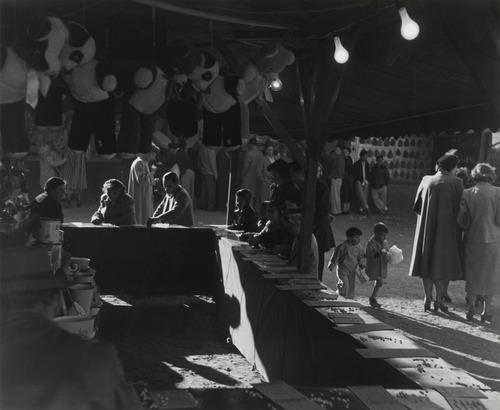
Aquatic Park, San Francisco
1949Minor White
1908 - 1976
1 2 3
_______________________
“Spotlight on the financial sector did make apparent just how bizarrely skewed our economy is in terms of who gets rewarded”
David Graeber interviewed by Thomas Frank
(....)
... the casual explanation is always consumerism. The idea is always that given the choice between four-hour days, and nine or ten-hour days with SUVs, iPhones and eight varieties of designer sushi, we all collectively decided free time wasn’t really worth it. This also ties into the “service economy” argument, that nobody wants to cook or clean or fix or even brew their own coffee any more, so all the new employment is in maintaining an infrastructure for people to just pop over to the food court, or Starbucks, on their way to or from work. So, sure, a lot of this is just taken as common sense if you do raise the issue to someone who doesn’t think about it very much. But it’s also obviously not much of an explanation.
First of all, only a very small proportion of the new jobs have anything to do with actually making consumer toys, and most of the ones that do are overseas. Yet even there, the total number of people involved in industrial production has declined. Second of all, even in the richest countries, it’s not clear if the number of service jobs has really increased as dramatically as we like to think. If you look at the numbers between 1930 and 2000, well, there used to be huge numbers of domestic servants. Those numbers have collapsed. Third, you also see that’s what’s grown is not service jobs per se, but “service, administrative, and clerical” jobs, which have gone from roughly a quarter of all jobs in the ‘30s to maybe as much as three quarters today. But how do you explain an explosion of middle managers and paper-pushers by a desire for sushi and iPhones?
And then, finally, there’s the obvious question of cause and effect. Are people working so many hours because we’ve just somehow independently conceived this desire for lattes and Panini and dog-walkers and the like, or is it that people are grabbing food and coffee on the go and hiring people to walk their dogs because they’re all working so much?
...(more)
_______________________
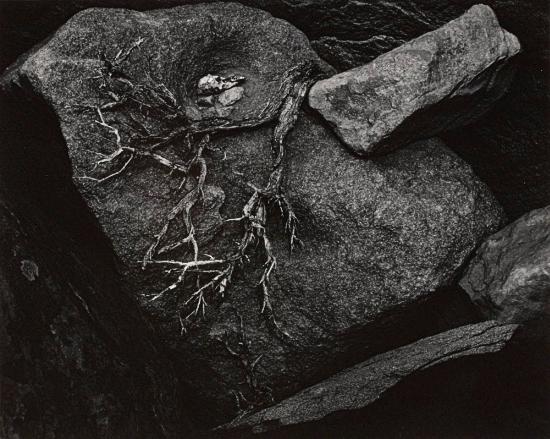
Capitol Reef
Utah
Minor White
1961
_______________________
Sonnet
Bill Knott
1940 - 2014
The way the world is not
Astonished at you
It doesn’t blink a leaf
When we step from the house
Leads me to think
That beauty is natural, unremarkable
And not to be spoken of
Except in the course of things
The course of singing and worksharing
The course of squeezes and neighbors
The course of you tying back your raving hair to go out
And the course of course of me
Astonished at you
The way the world is not
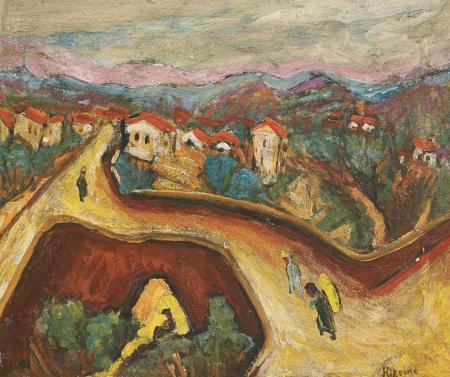
Figures on a Winding Path
Michel Kikoine
1892 - 1968
_______________________
Meditation and Struggle
Jeremy Trombley
Struggle Forever!
A Guide To Utopia
(....)
When it’s done properly, meditation isn’t easy. I think it was never meant to be. It is hard work – a process of confronting and engaging with the othernesses that compose* us. In that sense, meditation is simply another dimension of struggle - the intentional act of engaging with others, affecting them, and allowing one’s self to be affected by them. Through these intentional engagements, we are able to build build better relationships with those others over time – a never ending process of action, feedback, and reaction. In the case of meditation, we are able to build a better self – a more effective self, a more compassionate self, a more aware and attentive self. We will be more attuned to our interactions with “external” others and the changes and movements that have to be made to improve those interactions.
My own meditative practices haven’t been entirely peaceful, tranquil, or happy. I have stirred up a number of “demons” in the process – fear, sadness, anger. Sometimes sitting, breathing, and being attentive is the hardest thing for me to do – and I certainly don’t do it often enough. However, all of these engagements, I believe, have made me more capable of engaging with the broader world – whether that means fighting against injustice, or simply working through a disagreement with another. I wouldn’t go so far as to argue that every activist has to practice some kind of meditation. Engagement with others takes many forms, and the benefits I’ve described can come from any of them. But I do think that meditation can be a valuable form of engagement that contributes positively to the struggle.
...(more)
via —synthetic_zero
_______________________
You Furze, Me Gorse
Sarah Hannah
The only true synonyms in the English language
are “furze” and “gorse.” — Tennyson
Furze, Gorse, of equal and abiding value
But for the speed of each word off the lips:
The warm and cornucopic cup of U
Hanging on by the very fingertips
Of the lazy Z. Furze, you would lie,
Luxurious; you would make a mattress;
You would carry yellow torches nightly,
Barbed fingers circling in slow caress.
Raise the lamps high, let us look at ourselves:
Once a tender union, now turned fierce,
Twins scratching across sands and rocky shelves.
Furze, Gorse. Which cuts worse?
The claws that grab and cling, purpling the skin,
Or the sudden spike that stabs and runs?
In Memoriam: Sarah Hannah
1966-2007
Eva Salzman
via forgottenness
_______________________
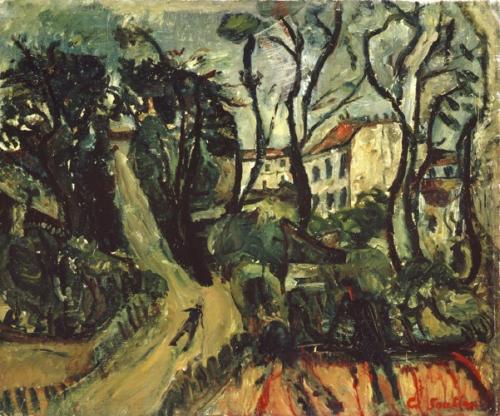
Chaim Soutine
1893 - 1943
_______________________
Disaster communism part 3 - logistics, repurposing, bricolage
Out of the Woods
(....)
It is this notion of repurposing as bricolage that we wish to elaborate, as it seems to unify the localised mutual aid of disaster communities with the global problematic of disaster communisation. The term was introduced into social theory by the anthropologist Claude Lévi-Strauss in 1962, and developed by, amongst others, Gilles Deleuze and Felix Guattari:
Bricolage ( ...) the possession of a stock of materials that or of rules of thumb that are fairly extensive and at the same time limited; the ability to rearrange fragments continually in new and different patterns or configurations.
Deleuze and Guattari, with their psychoanalytic hats on, are here concerned with elaborating schizophrenic cognition: the ceaseless connection and reconnection of seemingly unrelated words, concepts, objects. The translators' note to the quoted passage offers a more useful and plainly stated definition: "bricolage: (...) The art of making do with what is at hand." This is precisely the logic of disaster communism.
...(more)
_______________________
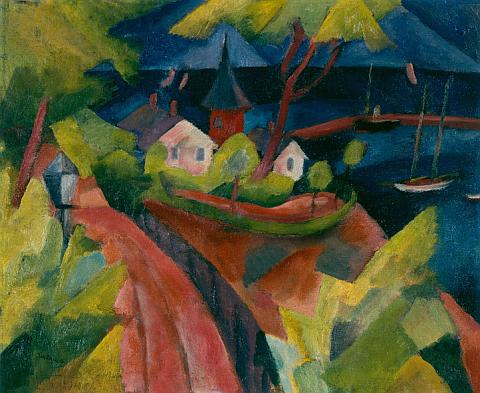 Wiek bei Greifswald
1916
Paul Adolf Seehaus
1891 - 1919
_______________________
Miracle in the Rain
From Clarice Lispector’s Near to the Wild Heart
Biblioklept
“... Raindrops and stars, this dense and chilling fusion has roused me, opened the gates of my green and sombre forest, of this forest smelling of an abyss where water flows. And harnessed it to night. Here, beside the window, the atmosphere is more tranquil. Stars, stars, zero. The word cracks between my teeth into fragile splinters. Because no rain falls inside me, I wish to be a star. Purify me a little and I shall acquire the dimensions of those beings who take refuge behind the rain.”
...(more)
_______________________
(…) The dull clank of metal on bone,
strikes at various consciousnesses, sometimes in Iceland,
near the coast, whale bones and tanks.
I saw a black-and-white picture of the waves,
and from then on I’ve thought waves are
black-and-white. No war, no peace will
last forever. The memory stick flashes, a hand
removes it from the computer. An organism must
continue long enough that its limits are exposed.
Sometimes, when you imagine you are a machine, sometimes
when you are a machine. A bottle of mineral water, empty-full, wine
on the floor, you walk naked towards the window.
Harry Salmenniemi
(from Kivirivit, Otava 2013. Translated by David Hackston
Young Finnish Poetry : An Approach
Max Oravin
Samplekanon
_______________________
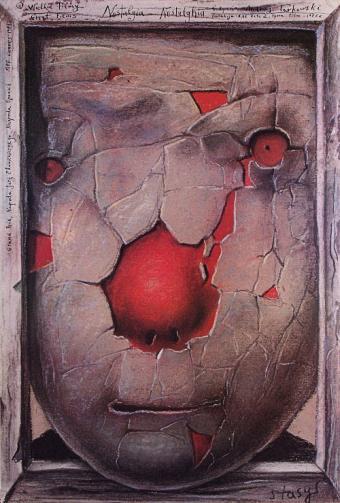
Film Poster For Tarkovsky’s Nostalghia
Stasys Eidrigevicius
via biblioklrpt
1 2
_______________________
Slavoj Žižek: On Spectral Materialism
posted by Craig Hickman
One should thus get rid of the fear that, once we ascertain that reality is the infinitely divisible, substanceless void within a void, “matter will disappear.” What the digital informational revolution, the biogenetic revolution, and the quantum revolution in physics all share is that they mark the reemergence of what, for want of a better term, one is tempted to call a post-metaphysical idealism. It is as if Chesterton’s insight into how the materialist struggle for the full assertion of reality, against its subordination to any “higher” metaphysical order, culminates in the loss of reality itself: what began as the assertion of material reality ended up as the realm of pure formulas of quantum physics. Is, however, this really a form of idealism? Since the radical materialist stance asserts that there is no World, that the World in its Whole is Nothing, materialism has nothing to do with the presence of damp, dense matter – its proper figures are, rather, constellations in which matter seems to “disappear,” like the pure oscillations of the superstrings or quantum- vibrations. On the contrary, if we see in raw, inert matter more than an imaginary screen, we always secretly endorse some kind of spiritualism, as in Tarkovsky’s Solaris, in which the dense plastic matter of the planet directly embodies Mind. This “spectral materialism” has three different forms: in the informational revolution, matter is reduced to the medium of purely digitalized information; in biogenetics, the biological body is reduced to the medium of the reproduction of the genetic code; in quantum physics, reality itself, the density of matter, is reduced to the collapse of the virtuality of wave oscillations (or, in the general theory of relativity, matter is reduced to an effect of space’s curvature). Here we encounter ANOTHER crucial aspect of the opposition idealism/materialism: materialism is not the assertion of inert material density in its humid heaviness – SUCH a “materialism” can always serve as a support for gnostic spiritualist obscurantism. In contrast to it, a true materialism joyously assummes the “disappearance of matter,” the fact that there is only void.
- Slavoj Žižek , Organs Without Bodies
|
































